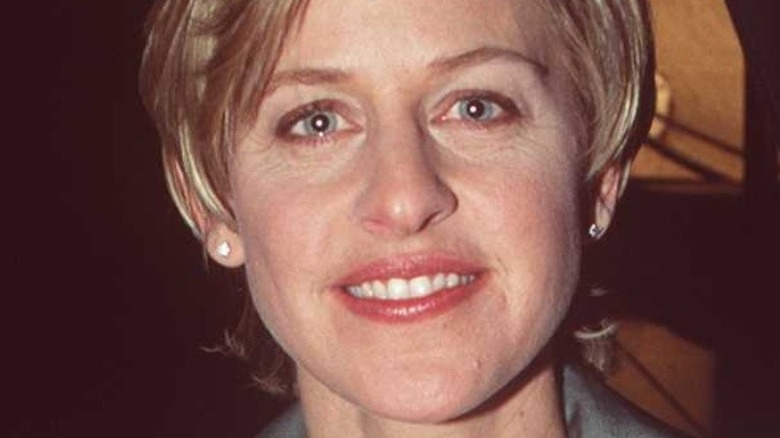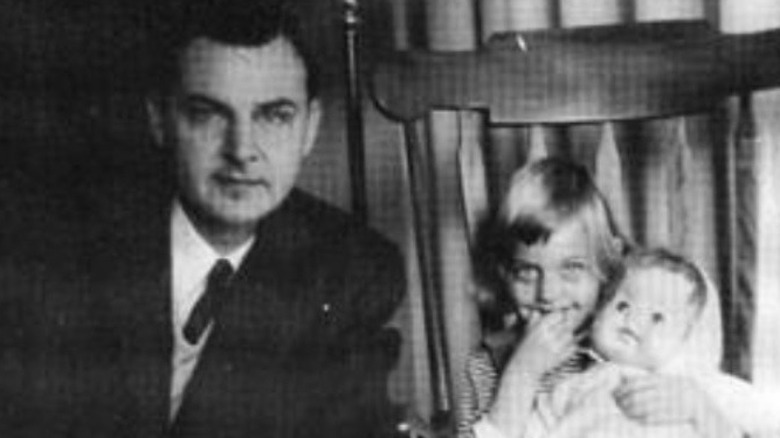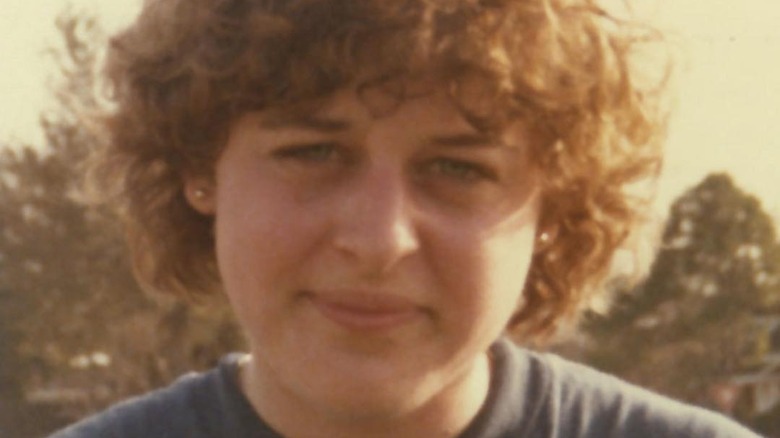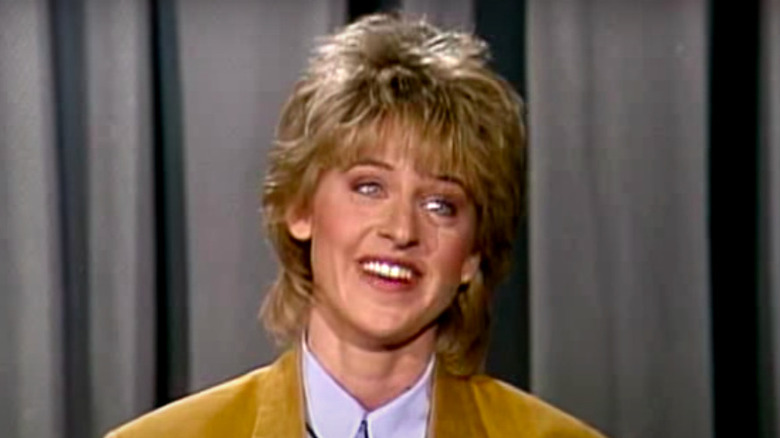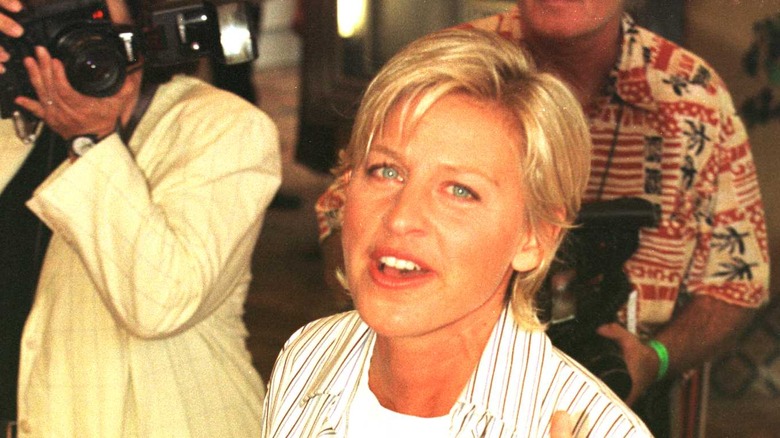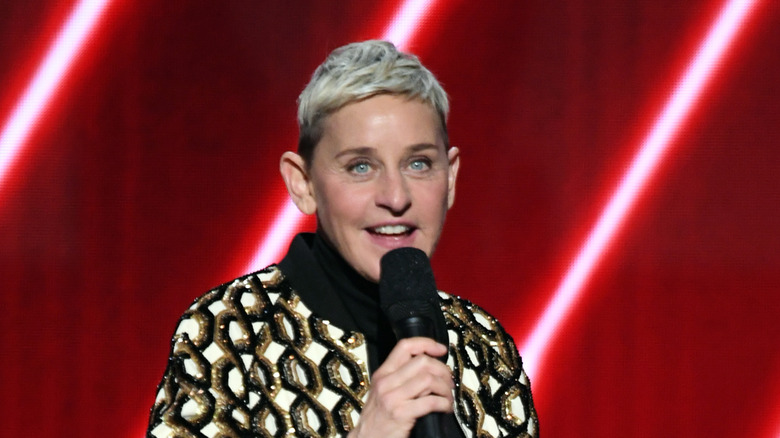The Transformation Of Ellen DeGeneres From Childhood To 63 Years Old
We may receive a commission on purchases made from links.
Ellen DeGeneres has been putting a smile on our faces and getting a cackle out of us since 2003. Since she started hosting "The Ellen DeGeneres Show," the comedian has become one of the most recognized TV hosts in daytime television and firmly cemented her place in our collective cultural fabric.
After 19 seasons and 30+ Daytime Emmy Awards, DeGeneres announced in May 2021 that the popular talk show will come to an end, as she told The Hollywood Reporter. "When you're a creative person, you constantly need to be challenged — and as great as this show is, and as fun as it is, it's just not a challenge anymore," she said.
While her talk show is her most successful venture, DeGeneres has enjoyed a fruitful career, thanks to her immense talent as a stand-up comedian, TV host, actor, writer and producer. Her role in the sitcom "Ellen" between 1994 and 1998 earned her growing popularity with her portrayal of charismatic bookstore owner Ellen Morgan, a show for which she won an Emmy for Outstanding Writing. She also lent her voice to the popular character Dory in Pixar's "Finding Nemo" (2003), which made her the first person to ever win a Saturn Award for voice acting, per the Emmy website.
Having her break in the early 1980s, DeGeneres has been in the spotlight for four decades as the public watched her evolve and mature in front of their eyes. Keep reading to see her transformation over the years.
Ellen DeGeneres 'was't funny' as a child
Ellen DeGeneres isn't a natural-born comedian. In 2011, she told Good Housekeeping she was a "sensitive" kid who cared for injured animals she came across. "I was quiet as a kid and wasn't funny until I was a little older. Then I remember being funny, because I remember people laughing," she told the publication. She attributes her becoming a comedian to her keen sense of awareness. "I watch people's behavior and notice things. I think that's why I became a comedian. I notice how stupid the things we do are." She began writing songs about the stuff she was observing "and that turned into comedy," DeGeneres explained.
Born in the New Orleans metropolitan area in Louisiana in 1958, DeGeneres's parents divorced when she was 13, she told the publication. At that point, she and her mother, Elizabeth Jane, lived together alone. Her brother, Vance, stayed with their father, Elliott. She described feeling like she was her mother's "roommate" and having to "kick out" some of the "horrible men" her mother dated. "So, at 13, I kind of became an adult," she said.
During those years, DeGeneres discovered the power of comedy. She did what she could to try to cheer her mother up as she struggled, according to Lisa Iannucci's "Ellen DeGeneres: A Biography: A Biography." By making her mother laugh, "I would totally bring her from where I'd seen her start going into depression to all the way out of it," she said.
Ellen DeGeneres was the victim of sexual abuse as a teenager
Part of the reason Ellen DeGeneres has attracted massive audiences and built a strong following is her capacity of being candid and open about difficult and often taboo subjects. In 2019, DeGeneres told David Letterman that she was the victim of sexual assault at the hands of her stepfather. A couple of years after her parents divorced, DeGeneres's mother, Elizabeth, remarried in 1974 and moved to Atlanta, Texas, according to Lisa Iannucci's "Ellen DeGeneres: A Biography: A Biography."
Shortly after, her mother was diagnosed with breast cancer, she said, which her stepfather used as a pretext to touch her breasts. "He told me ... he'd felt a lump in [her mother's] breast and needed to feel my breasts," DeGeneres told Letterman. He continued to molest her, reaching a point in which she ran out of a window as he tried to break down her bedroom door, she told Letterman.
After graduating high school, DeGeneres returned to New Orleans to attend college, a decision partly motivated by her desire to escape from her stepfather, according to Iannucci. After leaving the University of New Orleans and taking up different jobs, DeGeneres began performing stand-up comedy routines for groups of friends, as Encyclopedia Britannica detailed. Her skills soon turned into invitations to perform in local coffee shops and, by the early 1980s, she was touring the country, per Britannica. In 1982, Showtime named her Funniest Person of the Year.
If you or anyone you know has been a victim of sexual assault, help is available. Visit the Rape, Abuse & Incest National Network website or contact RAINN's National Helpline at 1-800-656-HOPE (4673).
Ellen DeGeneres became the first female comedian on The Tonight Show with Johnny Carson
Ellen DeGeneres found wider recognition in 1986, when she was invited to perform on "The Tonight Show with Johnny Carson," marking her first appearance on national television. As People noted, she made history that night by becoming the first woman to perform on the show.
On her "My Next Guest Needs No Introduction with David Letterman" in 2019, DeGeneres recalled forgetting to put the emergency brakes on her car when she parked on a steep street due to her anxiety over going on the show. "I was so nervous because I had time to really think about it. I went to a store on Melrose to get something and I go inside and I come out — this is the day of that I'm going to Carson — and my car is gone," she told Letterman.
As People detailed, her performances on "The Tonight Show" helped to take her career to the next level. In 1989, she was cast to star in the sitcoms "Open House" and "One Night Stand," as Encyclopedia Britannica noted. In the 1990s, DeGenerous found immense success with "Ellen," which snagged several accolades, including four Golden Globe and 10 Emmy nominations. On the heels of the success of "Ellen," DeGenerous published her memoir, "My Point...And I Do Have One," in 1995, which became a No.1 New York Times bestseller.
In 1997, Ellen DeGeneres made history when she came out as gay
On April 14, 1997, Ellen DeGeneres appeared on the cover or Time magazine next to the now-famous words, "Yep, I'm gay," making her "TV's first openly gay star," according to the article. Her decision to publicly come out as lesbian was accompanied by the coming out of her character on the sitcom "Ellen." As History explained, rumors began to spread a few months earlier that her character would reveal she was gay in a special episode. The speculation sparked intense interest on the show and the character's sexuality, something that ABC took advantage of, per History.
While DeGeneres' decision to go public was groundbreaking, it came with a high price. After "The Puppy Episode" aired, in which the character came out to her therapist (Oprah Winfrey), and she began dating actor Anne Heche, DeGeneres was unable to find work for three years, according to W Magazine. "I did what was right: I came out, which was good for me, and ultimately it was the only thing I could do. And then I got punished for it. I was so angry, I was just so angry," she told W.
The news became a tabloid obsession, per Vanity Fair. The episode drew harsh criticism and the series was canceled the following season, per The New York Times. DeGeneres' career was at all-time low. She returned to TV with "The Ellen Show" in 2001, but it was canceled after 13 episodes.
Ellen DeGeneres rebuilt her career with her talk show
After her fall from grace, Ellen DeGeneres made a name for herself as a beloved TV host. NBC's "The Ellen DeGenerous Show" has been "an absolute phenomenon," said Mike Darnell, Warner Bros.' unscripted TV president, according to The Hollywood Reporter. "Although all good things must come to an end, you still have hope that truly great things never will," he said.
The cancelation of the talk show, however, comes amid a recent controversy that accused DeGeneres of promoting a "toxic work culture," as BuzzFeed News reported in July 2020. The publication spoke with 10 former employees, who claimed to have been fired after going on leave for medical or bereavement reasons. "That 'be kind' bulls**t only happens when the cameras are on. It's all for show," one told BuzzFeed.
On the first episode of Season 18, DeGeneres apologized, stating that she "learned that things happen here that never should have happened. I take that very seriously. And I want to say I am so sorry to the people who were affected," as THR noted. But her show saw its ratings decline after the expose, per the publication.
DeGeneres has been involved in many projects in recent years, including producing documentaries for Discovery and a return to stand-up with Netflix's "Relatable." Still, what she has in store is still unclear. According to THR, she hopes to dedicate more time to her conservation projects and maybe even snag a "juicy acting role."

